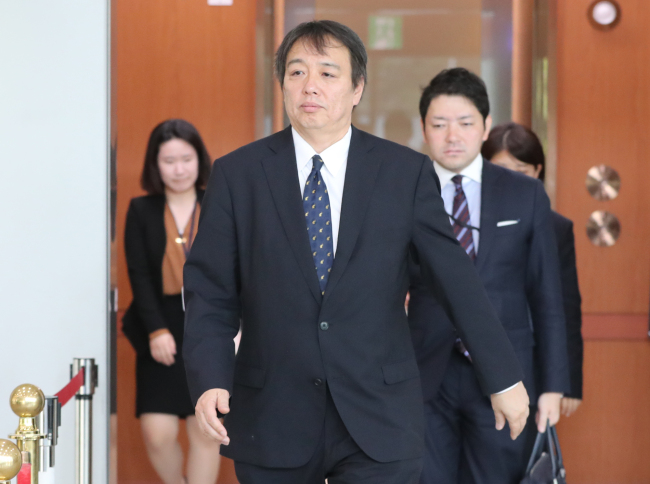South Korea on Tuesday condemned Japan’s repeated claim to the Dokdo islets in a foreign policy document presented to its cabinet, rekindling territorial and historical tensions between the two countries.
The Japanese government described the islets as “indigenous Japanese territory” in this year’s foreign policy document, known as the Diplomatic Bluebook, reported to its cabinet earlier in the day.
Seoul’s Foreign Ministry urged Tokyo to immediately retract its claim over the ownership of Dokdo, which is controlled by Seoul. The ministry summoned Koichi Mizushima, minister at the Japanese Embassy in Seoul, to lodge a complaint.

“The Japanese government’s reassertion of an unjust, absurd territorial claim over Dokdo will not be of help at all to the establishment of forward-looking South Korea-Japan relations,” the Ministry of Foreign Affairs said in a statement.
South Korea has tried to normalize icy ties with Japan, pursuing a “two-track” approach of separating contentious historical issues from current affairs and building a “future-oriented” relationship with Japan.
The ministry said it would “sternly respond” to any provocative action by Japan over Dokdo, which it said belongs to South Korea historically, geographically and in terms of international law.
Japan illicitly incorporated the Dokdo islets -- two main islands and some 30 smaller rocks -- as part of its territory at the height of the Russo-Japanese War in 1905, before colonizing the entire peninsula. South Korea has been in effective control of the islets since liberation from Japan in 1945. A South Korean Coast Guard detachment has been stationed there since 1954.
In the Japanese diplomatic paper, Japan said the “Sea of Japan” is the only name recognized in the eyes of international law as the name of the body of water lying between the two countries. South Korea refers to it as the “East Sea.”
Seoul’s Foreign Ministry called it “unacceptable” and stressed that the East Sea has been the justifiable name used for over 2,000 years.
Japan also did not label South Korea as its “most important neighbor” sharing strategic interests with Japan, unlike the 2017 version of the document.
Japan’s renewed claim to the islets comes as South Korea and Japan seek to maintain close coordination to achieve North Korea’s denuclearization, as the reclusive country is set to hold a historic summit with the US on June 12 in Singapore.
Although Seoul and Tokyo present a united front in tackling North Korea’s nuclear issue, bilateral relations have been strained over historical matters, including Japan’s wartime sexual slavery of Korean women and Japan’s claims to Dokdo.
In a fast-paced rapprochement in inter-Korean relations, Japanese Prime Minister Shinzo Abe even sought South Korean President Moon Jae-in’s help in resolving the issue of North Korea’s abduction of Japanese nationals in the 1970s and ’80s, ahead of Moon’s meeting with North Korean leader Kim Jong-un last month.
In March, Tokyo revised its school curriculum guidelines in order to teach Japanese high school students that the disputed islets of Dokdo belong to Japan. Last year, it revised the guidelines for primary school and middle school students, drawing condemnation from Seoul.
By Ock Hyun-ju (laeticia.ock@heraldcorp.com)
-
Articles by Ock Hyun-ju



















![[Today’s K-pop] BTS pop-up event to come to Seoul](http://res.heraldm.com/phpwas/restmb_idxmake.php?idx=642&simg=/content/image/2024/04/17/20240417050734_0.jpg&u=)